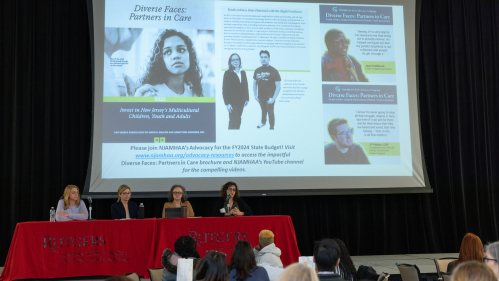Four young adults shared their stories of struggling at a recent mental health summit at Rutgers–New Brunswick, telling faculty, community members and students that having access to affordable therapy and medication along with the support of family, friends and community helped them deal with their anxiety and depression.
“While the healing journey is ongoing, I was fortunate to have an amazing familial support system and access to affordable medication and therapy that were instrumental in helping me through my mental health crisis," said Schuyler DeBree, a mental health advocate and one of the panelists at the summit. “It is disheartening and detrimental that many others who are struggling do not have these resources.”
Joshua Langberg, director of the Center for Youth Social Emotional Wellness (CYSEW), part of the Graduate School of Applied and Professional Psychology (GSAPP), said the stories that panelists shared “demonstrated the importance of intervention, accessible and affordable resources.”
These young adults were part of a recent CYSEW Youth Mental Health Equity Summit that focused on fostering collaboration to identify effective ways to bring mental health services to vulnerable youth.
“The summit’s purpose was to establish cross-disciplinary connections, to help thought leaders and decision-makers understand the state’s web of mental health services and how to navigate, not duplicate, efforts in pursuit of a common goal,” said Langberg.
The student panel, “Understanding barriers to mental health care and factors that lead to resilience,” focused on the importance of much-needed funding and initiatives that will have a positive impact on youth and young adults dealing with mental health issues.
Rutgers–New Brunswick Chancellor Francine Conway and Frank Ghinassi, president and chief executive of Rutgers University Behavioral Health Care, gave an overview of Rutgers Youth Behavioral Health Initiative and the Brandt Behavioral Health Treatment Center and Residence, CYSEW’s partners. CYSEW’s mission is to unite researchers and practitioners, community and business leaders, mental health providers and others to develop holistic, comprehensive strategies to confront persistent mental health inequities.
In New Jersey and nationally, systems and structural factors disproportionately affect underprivileged populations. Research shows a substantial divide in mental health disparities in terms of access to services, treatment gaps and more. Experts cite mounting reasons, such as mental health challenges, lack of resources, poor communication, lingering stigma, social media influence and situational pressures.
Youth mental health inequity, exacerbated by the pandemic and the university’s vital role, was the topic of a feature article in the winter 2023 edition of Rutgers Magazine, in which Langberg and colleagues offered their insight and expertise on this critical issue.
Arpana Inman, dean of GSAPP said, “the collaborative efforts of community agencies that support youth mental health and the foundations that fund NJ mental health services are invaluable in addressing the public health crisis of youth mental health inequity. Rutgers and GSAPP are certainly at the forefront of this issue, but it takes a village to innovate, implement and sustain actionable solutions.”
Langberg and Inman are members of the ScarletWell Task Force. Led by Conway, ScarletWell is a public health and prevention-focused approach to mental health and wellness for Rutgers-New Brunswick students, faculty and staff.
During a second panel discussion, leaders of state nonprofit organizations offered tips and strategies for grant proposal submissions. A working lunch offered the opportunity to view ideas, develop partnerships and plan a grant. To perpetuate relationship-building, GSAPP created a website tab listing all participants’ contact information and common themes the CYSEW team identified that could serve as a roadmap for continued collaboration, strategic planning and financial support.
Langberg, who hopes to make the Summit an annual event, said “I am very grateful for the time, effort and thought attendees put into identifying practical ways to improve and intersect the wellness and mental health care system for our youth. This is just the beginning of the conversation.’’
Visit GSAPP's web page on the event to learn more about the summit and attendees.



